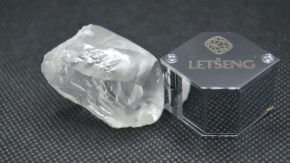RAPAPORT… The diamond industry must invest in new products and
ethically sourced natural diamonds to boost profitability and counter the
growth of synthetics, Martin Rapaport, Chairman of the Rapaport Group, stressed
at the annual Rapaport Breakfast in Las Vegas.
“The diamond trade is not profitable enough to support a
sustainable supply chain,” Rapaport said in an address to approximately 800
diamantaires and jewelers at the JCK Las Vegas show on Sunday. “If the trade
does not change its business practices and adapt to new realities, the diamond
industry will suffer extreme financial and regulatory disruption.”
He cautioned that the industry needed to stimulate growth
by emphasizing the value inherent in natural diamonds, rather than just the
sparkle. Disclosing diamonds’ source of origin will help defend that value,
particularly since the current ethical situation in the diamond market is
unacceptable and threatens the sustainability of the diamond trade, he
argued.
The trade is not taking the necessary steps to exclude
diamonds involved in human-rights abuses, money laundering and terror funding,
Rapaport explained. He pointed to imbalances in Dubai, where rough exports are
significantly higher than its imports, even though there is no source to
produce new rough in the region. Similarly, exports from the US of polished
goods below 0.50 carats exceeded their imports by $5 billion, which raises
alarm bells about the trade, he suggested.
Rapaport recognized that the challenge from synthetic
diamonds raised awareness of unethical practices in the natural-diamond trade.
However, he outlined some unethical practices of synthetics sellers that will
ultimately harm the wider industry:
-
Synthetics are being mixed with natural diamonds in
jewelry and consumers think they’re getting jewelry with 100% natural product. -
Sellers of synthetics make false claims about the ethical
benefits of synthetic diamonds but ignore the development benefits of natural
diamonds and exaggerate the negative impacts. -
Retailers are selling and
pricing synthetic diamonds in comparison to natural diamonds without disclosing
that synthetic diamonds do not retain value due to unlimited supply.
Rapaport called on the diamond trade to petition the
Federal Trade Commission and demand a disclosure statement be included on
invoices for lab-grown diamonds. He suggested the wording to include: “Prices
for lab-grown diamonds may diverge significantly from natural-diamond prices as
they can be produced in unlimited quantities, whereas the supply of natural
diamonds is limited by geological scarcity related to the size and quality of
the diamonds.”
Synthetics sellers are earning higher profit margins
based on the value perception of natural diamonds, Rapaport noted. This will
result in a consumer backlash against all diamonds since these values are not
sustainable, he warned.
“The claim that synthetic diamonds are exactly the same
as natural diamonds is false,” he stressed.
As an antidote, the industry must launch new products, invest
in ethically sourced natural diamonds, and recognize that the product reflects
the people who provide them, Rapaport continued.
“Diamonds are a reflection of all of us, and of the
commitment between people that love each other,” he concluded. “When all is
said and done, diamonds are only as good as we are. May our industry be worthy
of the product we sell. May we be up to diamonds.”



